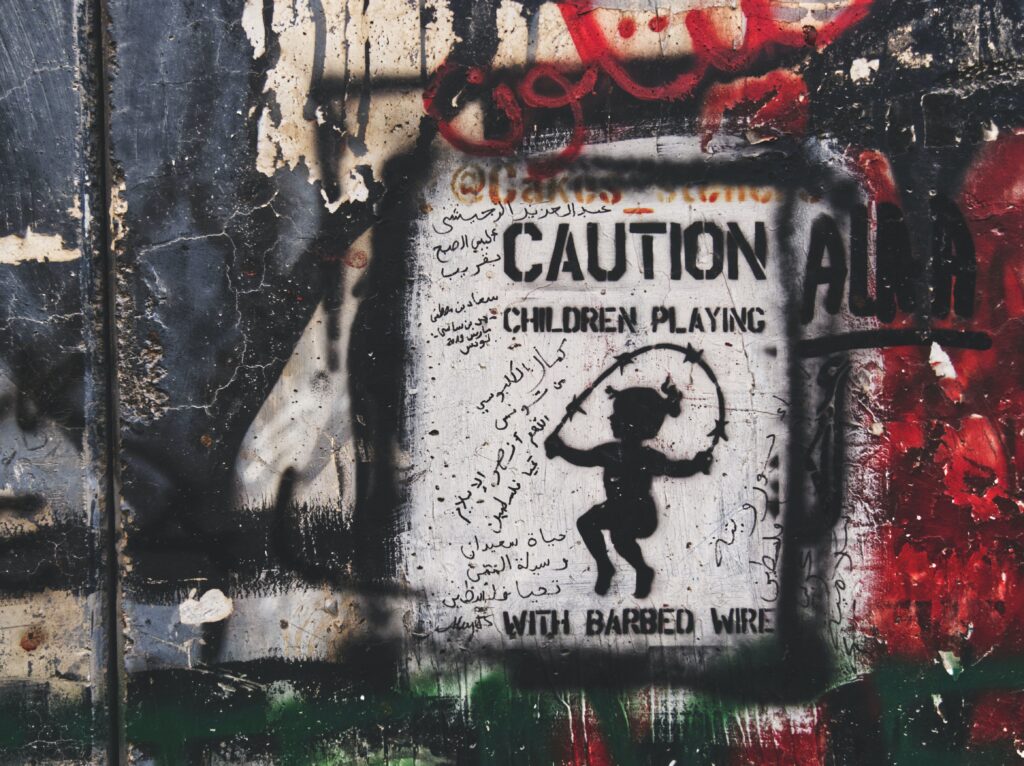Editor’s Note:
I’ve touched the Western Wall in Jerusalem, a place where Jews weep in sorrow and pour out generational grief over the atrocities they have experienced.
I’ve also touched the West Bank Wall and heard the heartache and pain of Palestinians who have been displaced, deprived and dehumanized.
Both places are heartbreaking.
What I learned during my brief time in Israel/Palestine was that human beings have a peculiar predisposition to become the very things they hate.
Nietzsche warned us of the danger of becoming what we oppose: “Beware that, when fighting monsters, you yourself do not become a monster… for when you gaze long into the abyss, the abyss gazes also into you.”
Injustice begets injustice, and the oppressed become the oppressors. It’s our human story of cyclical violence played out since the dawn of time.
As Richard Rohr says, “Pain that we don’t transform, we transmit.” The injustice perpetrated against us becomes the injustice we inflict upon our neighbor.
I follow the way of Jesus, who says that the Creator sends the “sun to rise on the evil and the good, and sends rain on the righteous and the unrighteous.” This means that God’s love is inclusive and all-encompassing. There are no “chosen” or “unchosen” people. Just people.
Jesus says in the same text that for us to be true children of the Creator, we must love likewise. Our love must not be discriminatory.
In fact, the love that Jesus models is boundary-breaking, curtain-tearing, culture-crossing, radically inclusive love. It extends even to those who would do us harm.
Jesus’ teaching in the Sermon on the Mount is not simply a list of platitudes to be minimized in favor of more exciting and speculative theology later in the New Testament. It is a manifesto for creative, nonviolent intervention that interrupts our cycles of violence.
According to Jarrod McKenna, Jesus is not commanding our passivity in the Sermon. Instead, Jesus is commanding insurgency to anything that diminishes our humanity. The Way of Jesus is dangerously inclusive and demandingly self-giving.
Ultimately, this is what the cross is. It is God’s creative, nonviolent intervention into our world to end our endless cycles of violence.
The cross is the great cosmic circuit breaker. It is God saying, “Retribution stops here.”
Three hundred years before Christ, Plato predicted that if a truly righteous person walked amongst us, we would crucify them. And that is exactly what we did.
John’s gospel gives us the verdict: light came into the world, but we preferred darkness. However, the ultimate surprise is that when Christ is resurrected, despite all we have inflicted on him, he doesn’t come back threatening vengeance.
Brian Zahnd notes that the first word uttered to the new world is not one of revenge but one of peace: “Peace be upon you.” There isn’t a hint of retribution in the crucified-risen Lord.
In breaking the cycle of violence, a new way is opened up for us: the way of forgiveness, the way of co-suffering enemy love, the way of creative nonviolence. This is the only way that will save us from ourselves. This is the only way that we will break our cycles of violence, exploitation, greed, manipulation and retribution.
The great travesty of Christianity is how it became a hyper-individualized religion focused on getting disembodied souls into some other place rather than the way to bring heaven to earth, redeeming the hells that we have created, transforming them into gardens of human flourishing.
Today, more than ever, we need people to follow the Way of Jesus—a Way that must be practiced, not just believed.
The world needs people willing to stand up and say, “Retribution stops here. The cycle of violence stops with me. I will be the circuit breaker. I will take up my cross, carry the pain, and transform it so that it is not endlessly transmitted to future generations.”
The fundamental problem is that this goes against everything in our human nature. It requires a miracle. It requires an intervention of grace. It requires a gospel of peace.

